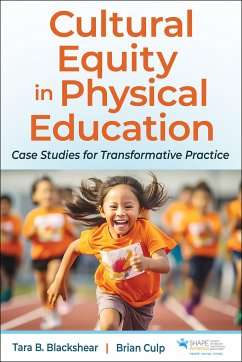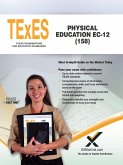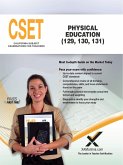Brian Culp, Tara B. Blackshear
Cultural Equity in Physical Education
Case Studies for Transformative Practice
Brian Culp, Tara B. Blackshear
Cultural Equity in Physical Education
Case Studies for Transformative Practice
- Broschiertes Buch
- Merkliste
- Auf die Merkliste
- Bewerten Bewerten
- Teilen
- Produkt teilen
- Produkterinnerung
- Produkterinnerung
Cultural Equity in Physical Education amplifies crucial issues that affect students from racialized groups, provides culturally aware teaching strategies, and addresses the litany of racist practices (both unintentional and overt) directed toward Black, American Indian, Asian, Latine, and Indigenous youths.
Andere Kunden interessierten sich auch für
![NYSTCE CST Physical Education 076 NYSTCE CST Physical Education 076]() Sharon A. WynneNYSTCE CST Physical Education 07657,99 €
Sharon A. WynneNYSTCE CST Physical Education 07657,99 €![MTEL Physical Education 22 Teacher Certification Test Prep Study Guide MTEL Physical Education 22 Teacher Certification Test Prep Study Guide]() Sharon A. WynneMTEL Physical Education 22 Teacher Certification Test Prep Study Guide57,99 €
Sharon A. WynneMTEL Physical Education 22 Teacher Certification Test Prep Study Guide57,99 €![FTCE Physical Education K-12 Teacher Certification Test Prep Study Guide FTCE Physical Education K-12 Teacher Certification Test Prep Study Guide]() Sharon A. WynneFTCE Physical Education K-12 Teacher Certification Test Prep Study Guide57,99 €
Sharon A. WynneFTCE Physical Education K-12 Teacher Certification Test Prep Study Guide57,99 €![Ceoe Osat Physical Education-Safety-Health Field 12 Certification Test Prep Study Guide Ceoe Osat Physical Education-Safety-Health Field 12 Certification Test Prep Study Guide]() Sharon A. WynneCeoe Osat Physical Education-Safety-Health Field 12 Certification Test Prep Study Guide57,99 €
Sharon A. WynneCeoe Osat Physical Education-Safety-Health Field 12 Certification Test Prep Study Guide57,99 €![TExES Physical Education Ec-12 (158) TExES Physical Education Ec-12 (158)]() Sharon A WynneTExES Physical Education Ec-12 (158)57,99 €
Sharon A WynneTExES Physical Education Ec-12 (158)57,99 €![Cset Physical Education (129, 130, 131) Cset Physical Education (129, 130, 131)]() Sharon A WynneCset Physical Education (129, 130, 131)57,99 €
Sharon A WynneCset Physical Education (129, 130, 131)57,99 €![Gace Health and Physical Education 115, 116 Teacher Certification Test Prep Study Guide Gace Health and Physical Education 115, 116 Teacher Certification Test Prep Study Guide]() Sharon A. WynneGace Health and Physical Education 115, 116 Teacher Certification Test Prep Study Guide57,99 €
Sharon A. WynneGace Health and Physical Education 115, 116 Teacher Certification Test Prep Study Guide57,99 €-
-
-
Cultural Equity in Physical Education amplifies crucial issues that affect students from racialized groups, provides culturally aware teaching strategies, and addresses the litany of racist practices (both unintentional and overt) directed toward Black, American Indian, Asian, Latine, and Indigenous youths.
Hinweis: Dieser Artikel kann nur an eine deutsche Lieferadresse ausgeliefert werden.
Hinweis: Dieser Artikel kann nur an eine deutsche Lieferadresse ausgeliefert werden.
Produktdetails
- Produktdetails
- Verlag: Human Kinetics Publishers
- Seitenzahl: 136
- Erscheinungstermin: 28. Oktober 2024
- Englisch
- Abmessung: 229mm x 152mm
- Gewicht: 249g
- ISBN-13: 9781718231887
- ISBN-10: 1718231881
- Artikelnr.: 70601678
- Herstellerkennzeichnung
- Produktsicherheitsverantwortliche/r
- Europaallee 1
- 36244 Bad Hersfeld
- gpsr@libri.de
- Verlag: Human Kinetics Publishers
- Seitenzahl: 136
- Erscheinungstermin: 28. Oktober 2024
- Englisch
- Abmessung: 229mm x 152mm
- Gewicht: 249g
- ISBN-13: 9781718231887
- ISBN-10: 1718231881
- Artikelnr.: 70601678
- Herstellerkennzeichnung
- Produktsicherheitsverantwortliche/r
- Europaallee 1
- 36244 Bad Hersfeld
- gpsr@libri.de
Tara B. Blackshear is an equity scholar specializing in health, physical activity, and education. She is an associate professor of kinesiology and the program coordinator of the physical education teacher education program at Towson University. She earned her bachelor's and master's degrees in physical education at Florida A&M University and received a doctorate in education in exercise and sport science at the University of North Carolina at Greensboro. Before her current role, Dr. Blackshear taught for 17 years in public, private, charter, and international schools in the United States, Egypt, and Thailand. In addition, she had a three-year post at the University of North Carolina at Chapel Hill, working to prevent type II diabetes among middle school students in the largest school-based physical activity intervention in the United States. Dr. Blackshear examines the social determinants of health and physical activity, fitness measures and outcomes, and inequities in education, with a particular focus on race, racism, women of color, and youths. Her interdisciplinary approach and candid perspective allow her to challenge the status quo, bring awareness, and provide solutions that confront structures that negatively affect the well-being of marginalized and minoritized groups. Dr. Blackshear's commitment to equity is evident in her work that appears in Quest, Physical Education and Sport Pedagogy, Journal of Racial and Ethnic Health Disparities, Journal of American College Health , Journal of African American Women and Girls in Education, Journal of Teaching in Physical Education, Curriculum Studies in Health and Physical Education, and Women in Sport and Physical Activity Journal as well as in her community, civic, and institutional engagement with SHAPE America, SHAPE Maryland, Maryland State Department of Education, Delaware State Department of Education, Partnership for a Healthier America, Physical and Health Education Canada, Philadelphia Public Schools, Washington DC Public Schools, and Baltimore City Public Schools. Dr. Blackshear's research has garnered national and international attention, as illustrated by her 2023 E.B. Henderson Award from SHAPE America. She was the first Black fellow of AIESEP. Dr. Blackshear is the founder and CEO of BLinG-Health. This nonprofit aims to assist Black girls in physical activity leadership to increase physical activity engagement, improve health, and foster a pipeline to health and physical activity fields, where there is very low representation of Black women. Brian Culp is a professor in the Wellstar College of Health and Human Services at Kennesaw State University. He completed his undergraduate studies in health and physical education at the University of Georgia, obtained a master's in sport administration from Georgia State University, and earned a doctorate in curriculum and instruction at the University of Georgia. Prior to his current position, Dr. Culp taught successfully at Armstrong Atlantic State University and Indiana University-Purdue University-Indianapolis. At each of these universities, he has trained future professionals for sustained community engagement in the United States, Canada, Africa, and the Dominican Republic. Dr. Culp is fueled by the search for truth and the desire to expand upon what physical education can be in the future. A lifelong learner, with over 100 national, international, and invited keynote presentations, Dr. Culp's research has incorporated topics under the umbrella of promoting equity. These areas have included culturally responsive teaching and learning, youth development, inclusiveness, spatiality, sport, and intergenerational health and physical activity. His work has appeared in journals such as Quest, Pedagogy in Health Promotion, Qualitative Health Research, and International Journal of Sports Science & Coaching and in the books Social Justice in Physical Education, Sociocultural Issues in Physical Education, Global Perspectives on Physical Education and Sport, and Teaching About Social Justice Issues in Physical Education. He has been involved in numerous projects for organizations such as Physical and Health Education Canada, Sport for Life, SHAPE America, the Centers for Disease Control, and the National Board for Professional Teaching Standards. Dr. Culp is the 34th fellow of the National Association for Kinesiology in Higher Education (NAKHE) and has been honored as a Delphine Hanna Lecturer and Dudley Allen Sargent Lecturer. He has also served as a vice president and engaged scholar mentor in the organization. Other notable recognitions have included a dissertation award from the Georgia Association of Teacher Educators (GATE); the Hally Beth Poindexter Young Scholar Award, Distinguished Scholar Award, and Distinguished Service Award from NAKHE; and the Mabel Lee Award, the Social Justice and Diversity Young Professionals Award, and the E.B. Henderson Award from SHAPE America. He is a fellow of SHAPE America. Internationally, Dr. Culp has been a Fulbright scholar and visiting research chair in Montreal, Canada and a Fulbright-Hays program participant (traveling to Kenya), and he currently serves within the Fulbright specialist program. He has held K-12 health and physical education certifications in the states of Georgia and Indiana, an accomplishment that underscores his affinity for teaching, learning, and practitioner-scholarship endeavors.
Case Study 1. Aspire to Inspire: Forced Assimilation of Mi Gente
Martin Vasquez, Victoria Shiver, and Karen Gaudreault
Case Study 2. Juggling Two Different Languages, Cultures, and Identities: A
Japanese Immigrant
Emi Tsuda
Case Study 3. Black AF
John D. Strong
Case Study 4. Assimilation Station: Intracultural Battle
Victor Ramsey
Case Study 5. Beyond Spelling Bees and Curries: Teaching Indian Students
Beyond the Physical Education Classrooms
SriPadmini Chennapragada
Case Study 6. Navigating Power and Privilege: A Korean Female Faculty
Teaching in White Male–Dominant Spaces
Mijoo Kim
Case Study 7. Tragic Mulatto: Being Multicultural in a White Supremacy
World
Cara Grant
Case Study 8. “They Don’t Speak English”: Deficit Thinking and Immigrant
Students
Luciana Zuest
Case Study 9. Two Worlds Apart: A Navajo Walking in the World of Whiteness
Rachelle Jones
Martin Vasquez, Victoria Shiver, and Karen Gaudreault
Case Study 2. Juggling Two Different Languages, Cultures, and Identities: A
Japanese Immigrant
Emi Tsuda
Case Study 3. Black AF
John D. Strong
Case Study 4. Assimilation Station: Intracultural Battle
Victor Ramsey
Case Study 5. Beyond Spelling Bees and Curries: Teaching Indian Students
Beyond the Physical Education Classrooms
SriPadmini Chennapragada
Case Study 6. Navigating Power and Privilege: A Korean Female Faculty
Teaching in White Male–Dominant Spaces
Mijoo Kim
Case Study 7. Tragic Mulatto: Being Multicultural in a White Supremacy
World
Cara Grant
Case Study 8. “They Don’t Speak English”: Deficit Thinking and Immigrant
Students
Luciana Zuest
Case Study 9. Two Worlds Apart: A Navajo Walking in the World of Whiteness
Rachelle Jones
Case Study 1. Aspire to Inspire: Forced Assimilation of Mi Gente
Martin Vasquez, Victoria Shiver, and Karen Gaudreault
Case Study 2. Juggling Two Different Languages, Cultures, and Identities: A
Japanese Immigrant
Emi Tsuda
Case Study 3. Black AF
John D. Strong
Case Study 4. Assimilation Station: Intracultural Battle
Victor Ramsey
Case Study 5. Beyond Spelling Bees and Curries: Teaching Indian Students
Beyond the Physical Education Classrooms
SriPadmini Chennapragada
Case Study 6. Navigating Power and Privilege: A Korean Female Faculty
Teaching in White Male–Dominant Spaces
Mijoo Kim
Case Study 7. Tragic Mulatto: Being Multicultural in a White Supremacy
World
Cara Grant
Case Study 8. “They Don’t Speak English”: Deficit Thinking and Immigrant
Students
Luciana Zuest
Case Study 9. Two Worlds Apart: A Navajo Walking in the World of Whiteness
Rachelle Jones
Martin Vasquez, Victoria Shiver, and Karen Gaudreault
Case Study 2. Juggling Two Different Languages, Cultures, and Identities: A
Japanese Immigrant
Emi Tsuda
Case Study 3. Black AF
John D. Strong
Case Study 4. Assimilation Station: Intracultural Battle
Victor Ramsey
Case Study 5. Beyond Spelling Bees and Curries: Teaching Indian Students
Beyond the Physical Education Classrooms
SriPadmini Chennapragada
Case Study 6. Navigating Power and Privilege: A Korean Female Faculty
Teaching in White Male–Dominant Spaces
Mijoo Kim
Case Study 7. Tragic Mulatto: Being Multicultural in a White Supremacy
World
Cara Grant
Case Study 8. “They Don’t Speak English”: Deficit Thinking and Immigrant
Students
Luciana Zuest
Case Study 9. Two Worlds Apart: A Navajo Walking in the World of Whiteness
Rachelle Jones








